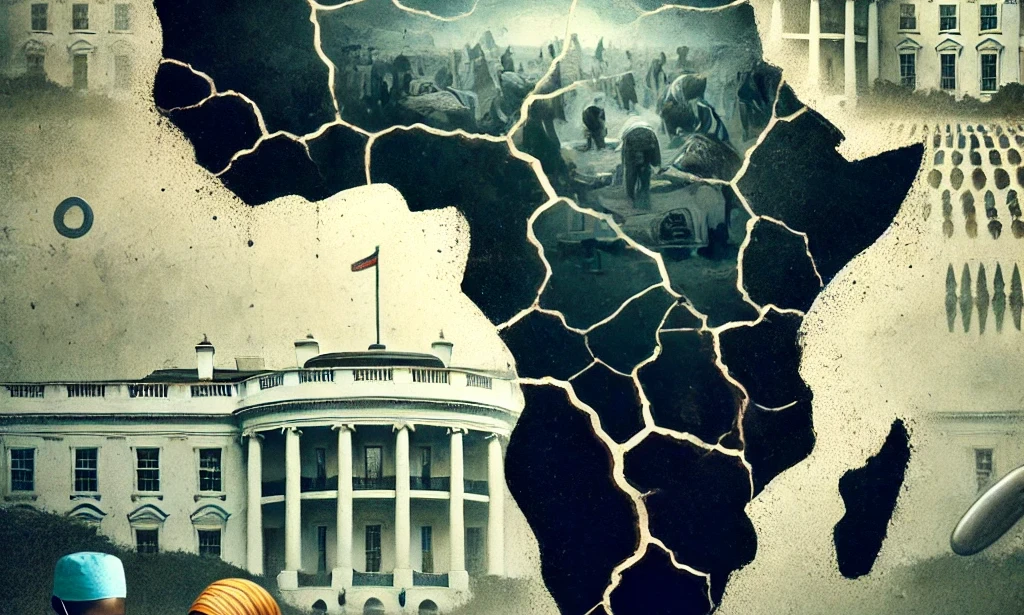The Impact of President "Donald Trump's" 2025 Policies on Health in Africa
The election of President "Donald Trump" in 2025 has led to significant shifts in U.S. foreign policy, particularly in global health funding. With deep cuts to aid programs, the withdrawal from the World Health Organization (WHO), and restrictions on international funding, African nations that heavily depend on U.S. support for healthcare services are facing an unprecedented crisis. The consequences of these changes are already evident, threatening efforts to combat HIV/AIDS, malaria, maternal health complications, and emerging disease outbreaks.
Cutting USAID: A Death Sentence for Millions?
One of the most immediate and devastating actions taken by the Trump administration in 2025 was the drastic reduction of U.S. Agency for International Development (USAID) funding. The administration slashed over 90% of USAID contracts, amounting to a staggering $60 billion cut in overseas aid. This move resulted in the termination of more than 10,000 contracts with organizations working on health, nutrition, and disease prevention across the continent.
The impact has been particularly severe in countries like South Sudan, Ethiopia, Congo, Senegal, and Nigeria, where millions relied on U.S.-funded health programs. In South Africa, where U.S. aid has historically supported HIV/AIDS treatment, modeling suggests that over 500,000 people could die in the next decade due to a lack of antiretroviral therapy. Programs supporting pregnant women, orphans, and marginalized communities such as sex workers and the LGBTQ+ population have been forced to shut down, leaving thousands without medical care.
In Tanzania, Lesotho, and Eswatini, the Elizabeth Glaser Pediatric AIDS Foundation, which treated over 350,000 people, has closed its operations. The ripple effect of these closures is expected to worsen the HIV/AIDS epidemic, reversing decades of progress made under the President's Emergency Plan for AIDS Relief (PEPFAR), which was established in 2003 to curb the disease in Africa.
The WHO Withdrawal: Abandoning Africa’s Health Security
President "Trump's" decision to withdraw the U.S. from the WHO has had further consequences for Africa’s health sector. The U.S. was the single largest donor to the WHO, contributing nearly 18% of the agency's funding. Without this support, crucial programs—including polio eradication, malaria prevention, and pandemic preparedness—are struggling to stay afloat.
The timing of the withdrawal could not have been worse. Many African nations rely on WHO-coordinated efforts to combat infectious diseases, and without U.S. funding, vaccine distribution programs, maternal and child health initiatives, and emergency response mechanisms have been severely disrupted. This move has also weakened Africa's ability to respond to new health threats, including Ebola outbreaks and emerging drug-resistant diseases.
Emerging Health Crises and Reduced Response Capacity
The consequences of these funding cuts have already begun to show. In Uganda, a new Ebola outbreak has claimed multiple lives, and without the same level of U.S. assistance, the government is struggling to contain it. The United Nations has launched an emergency appeal to raise $11.2 million to fight the outbreak, a task that historically would have been heavily supported by the U.S. government. However, with Trump’s administration pulling back from international health aid, WHO and other organizations have been forced to step in with limited resources.
Similarly, malaria control efforts have suffered setbacks. The U.S. has historically provided billions in funding to fight malaria in Africa, but with the latest aid reductions, preventive programs such as mosquito net distributions and access to life-saving medication have been curtailed. Malaria deaths, which had been on a steady decline, are now expected to rise again, reversing years of progress.
Partial Reversals: Too Little, Too Late?
Under mounting international pressure, the Trump administration announced partial reversals of some funding cuts, particularly for malaria and tuberculosis programs. However, these policy shifts have not been accompanied by the actual resumption of funding. Organizations like the RBM Partnership to End Malaria have reported receiving notification of these reversals, but they are still awaiting financial support to continue their operations.
In the meantime, many health initiatives remain in limbo, with millions of Africans left vulnerable to preventable diseases. Experts warn that even if funding is restored, the damage caused by months of inactivity will take years to undo, as weakened health systems struggle to regain lost ground.
Conclusion: A Grim Future for Africa’s Healthcare
The Trump administration's 2025 policies have placed Africa’s healthcare systems under immense strain. The USAID funding cuts, withdrawal from the WHO, and reduction of health aid have led to devastating consequences, affecting the fight against HIV/AIDS, malaria, maternal health, and emerging disease outbreaks. While some funding reversals have been announced, the long-term impact of these decisions will be felt for years to come.
Without urgent intervention from the international community, Africa faces a potential health catastrophe, with rising disease burdens, increased mortality rates, and a reversal of decades of progress in public health. The next few years will be crucial in determining whether alternative funding sources can step in to fill the gaps left by U.S. policy changes or if millions of lives will be lost due to political decisions made thousands of miles away.

You must be logged in to post a comment.